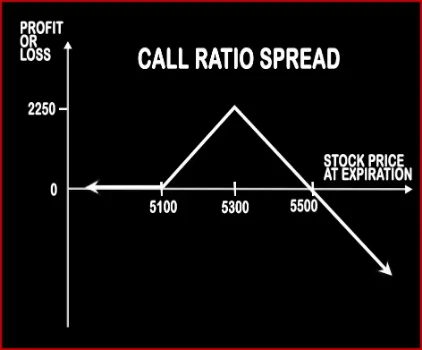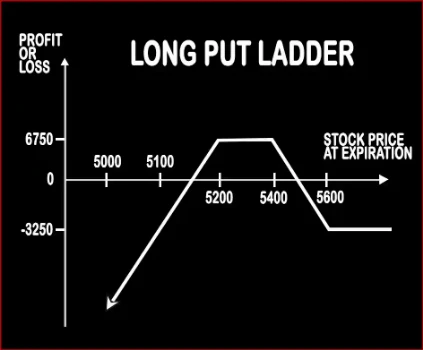Compare Strategies
| RATIO CALL SPREAD | LONG PUT LADDER | |
|---|---|---|

|

|
|
| About Strategy |
Ratio Call Spread Option StrategyAs the name suggests, a ratio of 2:1 is followed i.e. buy 1 ITM Call and simultaneously sell OTM Calls double the number of ITM Calls (In this case 2). This strategy is used by trader who is neutral on the market and bearish on the volatility in the near future. Here profits will be capped up to the premium amount and risk will be potentially unlimited since he is |
Long Put Ladder Option StrategyLong Put Ladder can be implemented when a trader is slightly bearish on the market and volatility. It involves buying of an ITM Put Option and sale of 1 ATM & 1 OTM Put Options. However, the risk associated with this strategy is unlimited and reward is limited. Risk:< .. |
RATIO CALL SPREAD Vs LONG PUT LADDER - Details
| RATIO CALL SPREAD | LONG PUT LADDER | |
|---|---|---|
| Market View | Neutral | Neutral |
| Type (CE/PE) | CE (Call Option) | PE (Put Option) |
| Number Of Positions | 3 | 3 |
| Strategy Level | Beginners | Advance |
| Reward Profile | Limited | Limited |
| Risk Profile | Unlimited | Unlimited |
| Breakeven Point | Upper Breakeven Point = Strike Price of Short Calls + (Points of Maximum Profit / Number of Uncovered Calls), Lower Breakeven Point = Strike Price of Long Call +/- Net Premium Paid or Received | Upper Breakeven Point = Strike Price of Long Put - Net Premium Paid, Lower Breakeven Point = Total Strike Prices of Short Puts - Strike Price of Long Put + Net Premium Paid |
RATIO CALL SPREAD Vs LONG PUT LADDER - When & How to use ?
| RATIO CALL SPREAD | LONG PUT LADDER | |
|---|---|---|
| Market View | Neutral | Neutral |
| When to use? | This strategy is used by trader who is neutral on the market and bearish on the volatility in the near future. Here profits will be capped up to the premium amount and risk will be potentially unlimited since he is selling two calls. | This Strategy can be implemented when a trader is slightly bearish on the market and volatility. |
| Action | Buy 1 ITM Call, Sell 2 OTM Calls | Buy 1 ITM Put, Sell 1 ATM Put, Sell 1 OTM Put |
| Breakeven Point | Upper Breakeven Point = Strike Price of Short Calls + (Points of Maximum Profit / Number of Uncovered Calls), Lower Breakeven Point = Strike Price of Long Call +/- Net Premium Paid or Received | Upper Breakeven Point = Strike Price of Long Put - Net Premium Paid, Lower Breakeven Point = Total Strike Prices of Short Puts - Strike Price of Long Put + Net Premium Paid |
RATIO CALL SPREAD Vs LONG PUT LADDER - Risk & Reward
| RATIO CALL SPREAD | LONG PUT LADDER | |
|---|---|---|
| Maximum Profit Scenario | Strike Price of Short Call - Strike Price of Long Call + Net Premium Received - Commissions Paid | Strike Price of Long Put - Strike Price of Higher Strike Short Put - Net Premium Paid - Commissions Paid |
| Maximum Loss Scenario | Price of Underlying - Strike Price of Short Calls - Max Profit + Commissions Paid | When Price of Underlying < Total Strike Prices of Short Puts - Strike Price of Long Put + Net Premium Paid |
| Risk | Unlimited | Unlimited |
| Reward | Limited | Limited |
RATIO CALL SPREAD Vs LONG PUT LADDER - Strategy Pros & Cons
| RATIO CALL SPREAD | LONG PUT LADDER | |
|---|---|---|
| Similar Strategies | Variable Ratio Write | Short Strangle (Sell Strangle), Short Straddle (Sell Straddle) |
| Disadvantage | • Unlimited potential loss. • Complex strategy with limited profit. | • Unlimited risk. • Margin required. |
| Advantages | • Downside risk is almost zero. • Investors can book profit from share prices moving within given limits. • Trader can maximise profit when the share closes at the upper breakeven point. | • Reduces capital outlay of bear put spread. • Wider maximum profit zone. • When there is decrease in implied volatility, this strategy can give profit. |